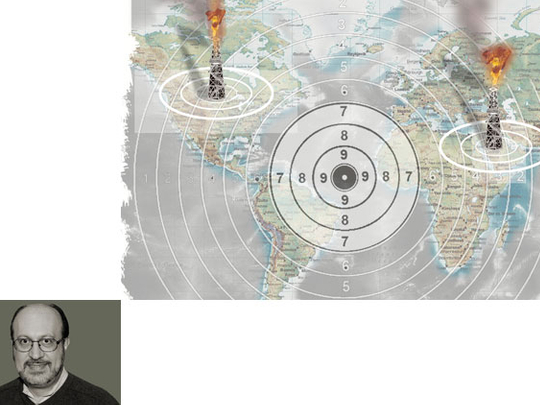
The lead editorial in the Wall Street Journal on November 13, titled ‘Saudi America’, commented on “the irony—and the opportunity—in [a recent] report that the US [was] likely to surpass Saudi Arabia as the world’s largest oil producer as early as 2020”. Really?
The editorialist attributed the energy revolution to technological innovations (horizontal drilling, hydraulic fracturing, wind-generated energy, natural gas, etc …), as well as the risk-taking that private investors engage in, which apparently ensured that US production would jump from 18 million barrels per day (mbpd) in 2012 to 23 mbpd in 2022. Of course, the conclusion revolved around Washington’s capacity to spot the dramatic innovative changes under way, and get out of the way to allow for prosperity. Under the circumstances, it was fair to ask whether the US would become energy independent, even if it were to pump more oil than the kingdom of Saudi Arabia?
This was not an idle question but a fundamental concern to global economic prosperity, because of Riyadh’s undeniable leadership over world oil markets, as well as its intrinsic capacity to sustain steady production over the long-haul. In fact, no other country managed, or was likely to attain the capability, to produce at will. Rather, everyone relied on global reserves — which were chiefly located on the Arabian Peninsula — and, equally important, on the intrinsic will of governments like the one in Saudi Arabia to stabilise markets whenever a production-related crisis emerged.
Naturally, while added oil production may well represent clear advantages, including the creation of jobs in economically depressed states where drilling reached unprecedented heights, in reality, oil remained a fungible commodity traded freely on global markets. Yet, past predatory preferences on oil resources were no longer effective, especially because demand from the developing world [China, India, etc…] soared and was likely to climb further.
To be sure, illusions were periodically created that additional oil production in non-Opec countries would lessen the alleged power of the Organisation of Petroleum Exporting Countries, but few accepted the notion that the Vienna-based organisation failed to qualify as a cartel, because it never gained control over consumer markets.
The only successful mechanisms available to Opec were to limit production and adopt price ceilings but neither the organisation nor its member-states ever gained full control over industrialized markets — a key component of a successful cartel. Ironically, major developed countries were effective cartels in the cases of so many primary products, which allowed them to enjoy geopolitical domination and economic prosperity.
Be that as it may, the predictions that increased American oil production, along with anticipated improvements in energy efficiency, were not the panaceas every politician proselytised from eminent domains. Ironically, while it was savvy to assume and promulgate that technological innovations were ideal ways to drill oneself out of oil dependence, in fact, nothing but a reduction in the spiraling consumption rates offered effective solutions. With over seven billion humans anxious to get hold of energy resources, including oil and gas, chances were excellent that a fairer distribution may well become a requirement rather than an option given that everyone sought higher living standards.
In the case of the US, and even if one were to simply ignore that oil production peaked in 1970 when the maximum flow-rate was around 10 mbpd, how was it possible to explain that consumption would reach nearly 20 mbpd in 2012? Moreover, to now claim that the US can actually out-produce Saudi Arabia may be fantasy rather than reality, even when one factored in all of the technical wizardry that allowed overconfident engineers to extract every last drop of fossil fuel from dinosaur bones.
The issue, therefore, was not just geopolitical but also economic, since science certainly improved our lot, but depletion of finite resources were not replicable.
Oil remained a predetermined resource and its replenishment was not even a theoretical issue. Those were simple facts and new technology can only help just a bit more, which meant that one must not live in utter denial. The world’s largest reserves are in the developing world and sheer pragmatism required one to come to terms with it.
Hypothetical reserves, frackable shale oil, and other innovations will nowhere be as voluminous as crude oil was/is, no matter what kind of claims are floated by over-anxious analysts. Even the large Alaska deposits, once assumed to be the salutary solution for the US, as well as controversial and environmentally sensitive coastal drillings, will barely yield a few additional billion barrels.
Truth be told, the US is now over 40 years past its peak in terms of physical oil abundance, but periodic reports still appear to assert that everything will change for the better. There is an ingrained belief that future generations can simply recreate economic booms to meet the needs of growing populations, whereas, in reality, the days of cheap energy that allowed for endless growth are numbered. Until an effective alternative is discovered, it may be far better to be on friendly terms with nations that enjoy an abundance of finite energy sources.
Dr Joseph A. Kechichian is the author of Legal and Political Reforms in Saudi Arabia.











